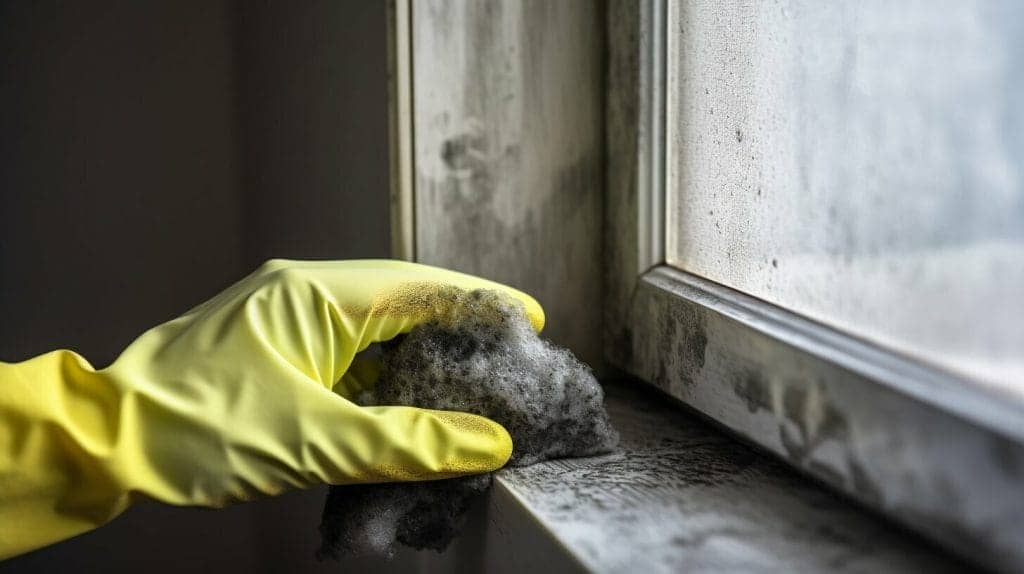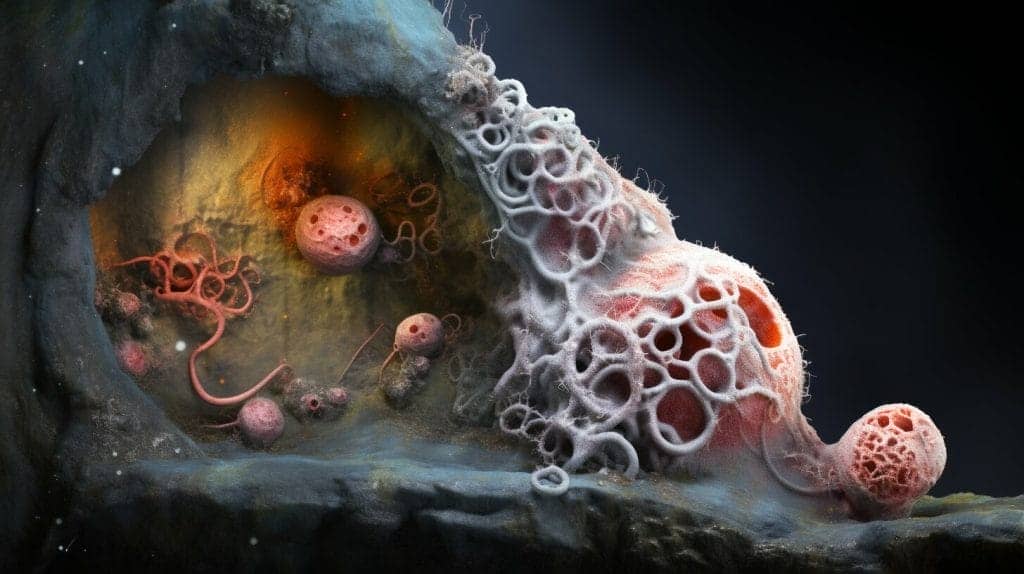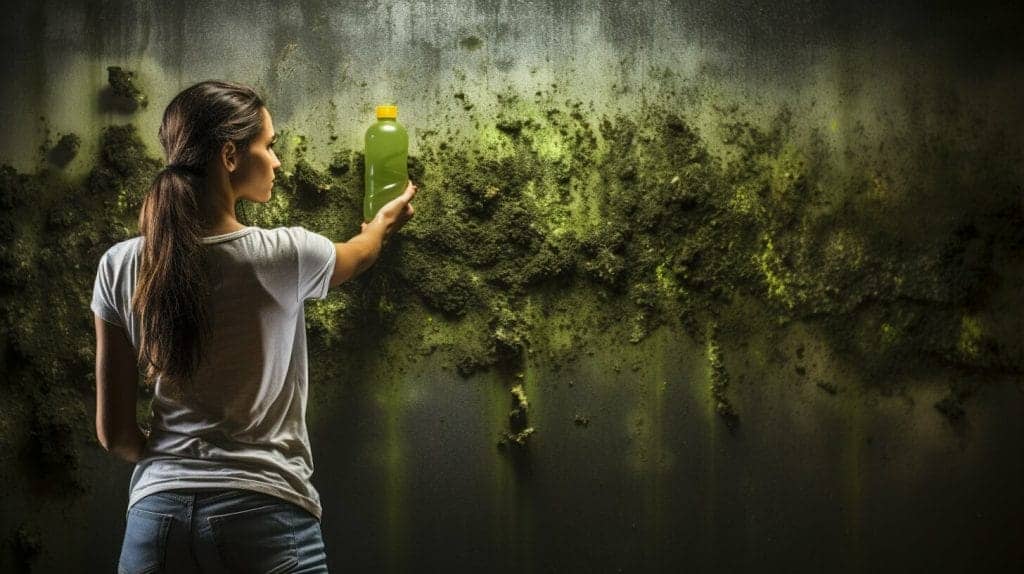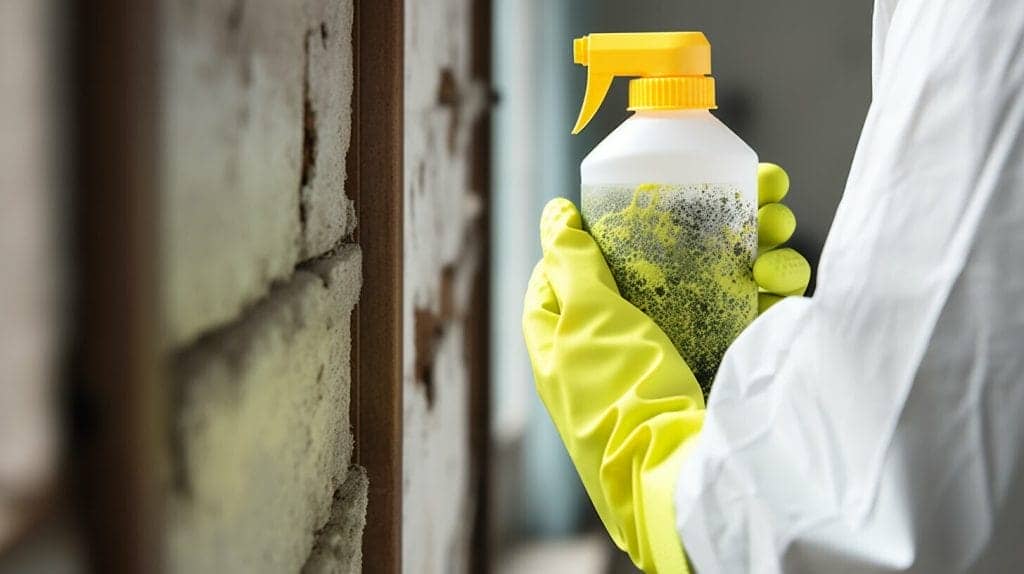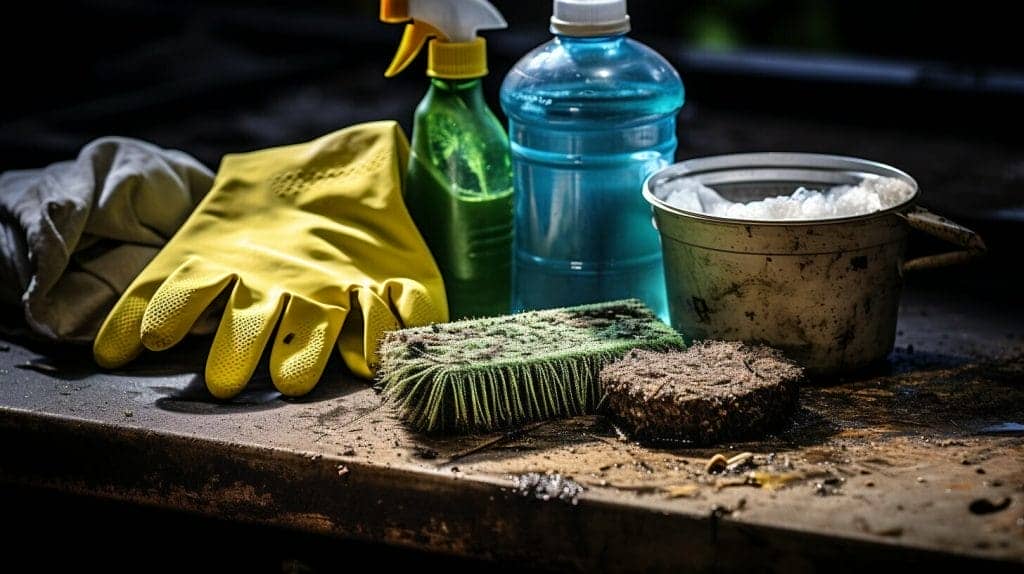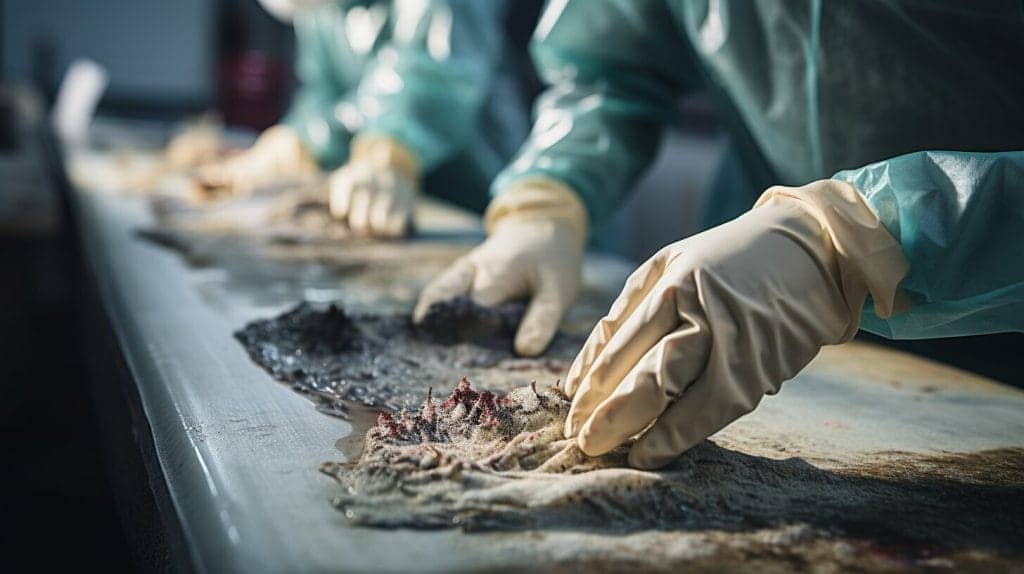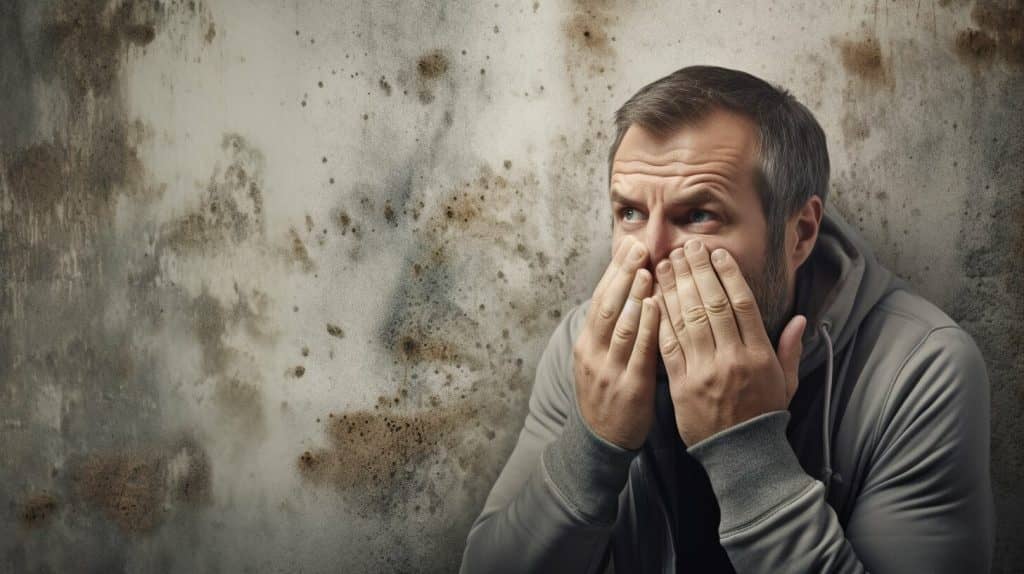Mold toxicity can be a serious health concern, causing a range of symptoms and complications in those who are exposed. Accurate diagnosis is key to effective treatment and prevention of long-term health issues. This article will provide an overview of the diagnostic criteria for mold toxicity, including key indicators and guidelines for identifying the condition in individuals.
Key Takeaways:
- Proper diagnostic criteria are essential for identifying and treating mold toxicity.
- Symptoms of mold illness can include physical, cognitive, and respiratory issues.
- Allergic reactions, respiratory problems, and skin issues are common symptoms of mold exposure.
- Diagnostic tests such as blood tests, urine tests, and skin tests can help identify mold-related health conditions.
- Healthcare professionals consider symptoms, medical history, and exposure history when diagnosing mold toxicity.
Understanding Mold Illness Symptoms
Mold illness symptoms can vary in severity and can manifest in different ways depending on the individual’s immune system and overall health. Common physical symptoms include fatigue, headaches, joint pain, and muscle weakness. Cognitive symptoms may include memory loss, difficulty concentrating, and brain fog. Respiratory symptoms may include shortness of breath, wheezing, and coughing.
Other symptoms include allergic reactions such as itchy eyes, skin rashes, and hives. Individuals may also experience gastrointestinal issues, such as nausea and diarrhea.
Mold illness symptoms can range from mild to severe and may develop quickly or gradually over time. It is important to recognize these symptoms and seek medical attention to diagnose and treat mold toxicity.
Identifying Mold Exposure Symptoms
Mold exposure can cause a variety of symptoms that can negatively impact an individual’s health. It is important to be aware of these symptoms so that individuals can take the necessary steps to prevent further exposure and seek appropriate medical attention.
Common symptoms of mold exposure include:
- Allergic reactions, such as sneezing, runny nose, and itchy eyes
- Respiratory issues, such as coughing, wheezing, and shortness of breath
- Skin problems, such as rashes and hives
In some cases, mold exposure can also lead to more severe health issues, particularly in individuals with pre-existing health conditions. These may include:
- Asthma
- Allergies
- Respiratory infections
- Immune system disorders
It is important to note that not all individuals will experience the same symptoms, and the severity of symptoms may vary. Additionally, some symptoms may not be immediately apparent and may develop over time as a result of prolonged exposure to mold.
“Common symptoms of mold exposure include allergic reactions, respiratory issues, and skin problems. Mold exposure can also lead to more severe health issues, particularly in individuals with pre-existing health conditions.”
Overview of Mold Toxicity Testing
There are various diagnostic tests available to determine if an individual has been exposed to mold and is experiencing mold-related illness. These tests can help healthcare professionals evaluate the severity of the condition and develop an appropriate treatment plan.
Blood tests can be used to measure the levels of mycotoxins, which are toxic substances produced by molds, in an individual’s blood. Urine tests can also detect mycotoxins in the body, as well as identify the presence of harmful metabolites. Another diagnostic tool is the skin prick test, where a small amount of the suspected allergen is inserted into the skin to determine an allergic reaction.
| Diagnostic Test | Description |
|---|---|
| Blood test | Measures levels of mycotoxins in the bloodstream |
| Urine test | Detects mycotoxins and metabolites in the urine |
| Skin prick test | Identifies an allergic reaction by inserting a small amount of the suspected allergen into the skin |
It is essential to note that while diagnostic tests can assist with identifying mold-related illness, they should not be the sole indicator of mold toxicity. Healthcare professionals should also consider an individual’s medical history, environmental exposure, and symptoms before making an accurate diagnosis.
Overview of Mold Toxicity Testing
In addition to these conventional diagnostic tests, the Oasis Medical Institute offers more comprehensive testing to identify mold toxicity. These tests include a detailed evaluation of an individual’s genetic makeup, gut health, and immune system function to develop a personalized treatment plan.
Guidelines for Mold Toxicity Diagnosis
Accurate diagnosis of mold toxicity is crucial for effective treatment and management of this health condition. Healthcare professionals follow specific guidelines to diagnose mold toxicity, taking into consideration various factors such as medical history, symptoms, and exposure history.
One of the key guidelines for mold toxicity diagnosis is the use of diagnostic testing. These include blood tests, urine tests, skin tests, and other laboratory tests that examine a patient’s immune system and response to mold. The results of these tests can help healthcare professionals identify the presence of mold-related health conditions.
Factors Considered for Mold Toxicity Diagnosis
When assessing a patient for mold toxicity, healthcare professionals take into account various factors:
| Medical History | The patient’s medical history is reviewed to identify any pre-existing conditions or environmental factors that may increase susceptibility to mold toxicity. Patients with compromised immune systems or chronic respiratory conditions, for example, may be more vulnerable to mold-related health issues. |
|---|---|
| Symptoms | Healthcare professionals look for a combination of symptoms that are indicative of mold exposure and toxicity. These may include respiratory symptoms like coughing, wheezing, and shortness of breath, as well as cognitive and neurological symptoms like memory loss, brain fog, and anxiety. |
| Exposure History | The patient’s exposure history to mold is also taken into account. This includes identifying potential sources of mold exposure in their living or working environments, as well as the duration and severity of exposure. |
By considering all these factors, healthcare professionals can provide an accurate diagnosis of mold toxicity and develop an effective treatment plan for the patient’s specific needs.
Effective Mold Toxicity Treatment Approaches
Mold toxicity can cause several health issues, and its treatment is crucial for overall well-being. An effective approach to treating mold toxicity involves a holistic and integrative program that combines conventional and alternative therapies. These therapies aim to address the underlying causes of the symptoms and support the body’s natural healing process.
At Oasis Medical Institute in Tijuana, MX, Dr. Francisco Contreras MD leads a comprehensive mold toxicity treatment program that considers the individual’s medical history, exposure history, and symptoms. The program combines various therapies, including:
| Therapy | Description |
|---|---|
| Detoxification | Removal of toxins from the body through therapies like IV ozone, hyperthermia, and colon hydrotherapy. |
| Nutrition | A personalized nutrition plan that emphasizes the consumption of whole, unprocessed foods and supplements to support the body’s natural detoxification processes. |
| Immune support | Treatments that aim to strengthen the immune system, such as thymus therapy and thymus gland extracts. |
| Stress reduction | Treatments that address stress and anxiety, such as psychotherapy, meditation, and acupuncture, to support the body’s natural healing process. |
The holistic approach at Oasis Medical Institute, led by Dr. Francisco Contreras MD, has proven to be highly effective in treating mold toxicity and restoring the patient’s overall health.
The Holistic Approach at Oasis Medical Institute
At Oasis Medical Institute, the holistic approach to treating mold toxicity involves identifying and addressing the root causes of the symptoms. This approach considers the individual’s lifestyle, eating habits, and environmental factors that may contribute to mold toxicity.
Dr. Francisco Contreras MD leads the team at Oasis Medical Institute in providing personalized care to each patient. The team works to design a customized treatment plan that addresses the individual’s unique set of symptoms and health concerns. By using a combination of conventional and alternative therapies, the treatment program focuses on restoring the patient’s overall health and well-being.
If you are struggling with mold toxicity, the holistic approach at Oasis Medical Institute may be the right choice for you.
Preventive Measures to Avoid Mold Toxicity
Mold exposure can be harmful to one’s health, and it is important to take preventive measures to avoid mold toxicity. Here are some guidelines to help reduce the risk of exposure:
- Avoid prolonged exposure to damp and humid environments.
- Use a dehumidifier to maintain relative humidity levels below 60%.
- Fix leaks and water damage as soon as possible to prevent mold growth.
- Clean and dry any areas affected by water within 24 to 48 hours.
- Regularly clean and maintain HVAC systems, including air ducts and filters.
- Do not carpet bathrooms, basements, or other areas that may be prone to water damage.
- Avoid using carpet in areas where moisture is prevalent, such as kitchens and bathrooms.
- Ensure proper ventilation in bathrooms, kitchens, and other areas that generate moisture.
- Monitor indoor humidity levels and address any issues promptly.
- Avoid storing items in damp areas such as basements, attics, and garages.
By taking these preventive measures, individuals can reduce their exposure to mold and lower the risk of developing mold-related health conditions.
Common Mold-Related Health Conditions
Mold exposure can cause or exacerbate a range of health conditions. Individuals who are allergic to mold may experience symptoms such as sneezing, coughing, and watery eyes. For those with asthma, exposure to mold can trigger attacks, making it difficult to breathe. Respiratory infections, such as bronchitis and pneumonia, can also develop as a result of mold exposure.
In addition to respiratory problems, mold exposure can contribute to skin irritation and rashes. Individuals with weakened immune systems, such as those living with HIV/AIDS, can experience more severe symptoms and may be at risk of developing fungal infections.
Research has also linked mold exposure to neurological symptoms, including headaches, memory problems, and difficulty concentrating. In some cases, exposure to toxic molds can lead to more serious conditions, such as mycotoxicosis, a rare and often misdiagnosed illness.
Recognizing Signs of Mold Toxicity
Mold toxicity can have a range of symptoms that can be difficult to identify. Here are some common signs to look out for:
- Headaches
- Fatigue
- Joint pain
- Muscle weakness
- Difficulty concentrating
- Memory problems
- Sensitivity to light
- Blurred vision
- Nausea and vomiting
- Abdominal pain
- Diarrhea
- Shortness of breath
- Coughing
- Wheezing
- Nasal congestion
- Runny nose
- Skin rashes or hives
- Sneezing
- Allergic reactions
If you have experienced any of these symptoms or suspect mold toxicity, it is essential to consult a qualified healthcare professional for proper diagnosis and treatment.
Understanding Mold Toxicity Complications
While mold toxicity can cause a variety of symptoms, it is important to understand the potential complications that can arise from untreated mold toxicity.
Mold toxicity can lead to long-term health issues if left untreated. Individuals who experience chronic exposure to mold may develop respiratory problems, such as asthma and chronic bronchitis. It can also weaken the immune system, making it more difficult for the body to fight off infections and illnesses.
Furthermore, mold toxicity can also cause neurological issues, such as memory loss, difficulty concentrating, and mood swings. Some individuals may experience vision and hearing problems, as well as skin irritation and sensitivity.
It is essential to seek proper diagnosis and treatment for mold toxicity to prevent these complications and ensure overall health and wellbeing.
The Holistic Approach at Oasis Medical Institute
At Oasis Medical Institute in Tijuana, MX, Dr. Francisco Contreras MD leads a comprehensive and integrative treatment program for mold toxicity. Their holistic approach focuses on addressing the root cause of mold-related health conditions and promoting overall wellness through natural and conventional therapies.
The program includes a thorough evaluation and diagnosis process using state-of-the-art diagnostic tools, such as blood tests, urine tests, and skin tests. Based on the findings, Dr. Contreras and his team design a personalized treatment plan that may include a combination of treatments, including nutritional therapy, IV vitamin therapy, hyperbaric oxygen therapy, and natural supplements.
In addition, the program emphasizes the importance of a healthy lifestyle and stress management techniques. The team at Oasis Medical Institute provides patients with education and resources on how to maintain a healthy diet, exercise regularly, and manage stress levels to support their recovery and improve their overall well-being.
Booking a Consultation for Holistic Mold Toxicity Treatment
If you or someone you know is struggling with mold toxicity, booking a consultation at Oasis Medical Institute in Tijuana, MX, may be the first step towards relief and healing. The holistic treatment program led by Dr. Francisco Contreras MD integrates conventional and alternative therapies to address the root cause of mold toxicity and restore overall health.
To book a consultation for the holistic mold toxicity treatment program, interested individuals can call 866-868-1992 to speak with a representative and schedule an appointment. The friendly staff at Oasis Medical Institute can answer any questions or concerns regarding the treatment program, as well as provide information on accommodations and travel arrangements for out-of-town patients.
Don’t let mold toxicity continue to affect your quality of life. Take control of your health by booking a consultation for the holistic mold toxicity treatment program at Oasis Medical Institute today.
Call to Action for Holistic Mold Toxicity Treatment
If you or a loved one is experiencing symptoms of mold toxicity, don’t wait to seek treatment. The holistic approach at Oasis Medical Institute, led by Dr. Francisco Contreras MD, has helped countless individuals regain their health and well-being.
To book a consultation for the holistic mold toxicity treatment program, call 866-868-1992 today. Take the first step towards a healthier future and discover the benefits of this effective and comprehensive treatment approach.
Conclusion
Accurate diagnosis and proper treatment are crucial when dealing with mold toxicity. The symptoms associated with mold exposure can be mistaken for other conditions, which is why it’s important to rely on the diagnostic criteria for mold toxicity. It’s essential to get tested by a qualified healthcare professional who can provide proper diagnosis and treatment.
Preventive measures, such as proper ventilation and regular cleaning, can also help reduce the risk of mold exposure. However, if left untreated, mold toxicity can lead to further health complications. It’s important to seek medical attention as soon as possible to prevent long-term health issues.
Oasis Medical Institute offers a holistic and integrative approach to treating mold toxicity led by Dr. Francisco Contreras MD. Their treatment program focuses on detoxification, nutrition, and immune system support. To book a consultation for their holistic mold toxicity treatment program, readers can call 866-868-1992.
Don’t wait until it’s too late. Take control of your health and seek proper treatment for mold toxicity. Call the number provided to book a consultation and start your journey towards holistic healing today.
FAQ
Q: What are the key indicators and guidelines for diagnosing mold toxicity?
A: The key indicators for diagnosing mold toxicity include symptoms such as respiratory issues, allergic reactions, and skin problems. Healthcare professionals follow guidelines that consider symptoms, medical history, and exposure history to accurately diagnose mold toxicity.
Q: What are the symptoms associated with mold illness?
A: Mold illness symptoms can include physical, cognitive, and respiratory issues. Common symptoms include fatigue, headaches, memory problems, and difficulty breathing.
Q: What are the symptoms specifically related to mold exposure?
A: Mold exposure symptoms can include allergic reactions, respiratory issues, and skin problems. Individuals may experience sneezing, coughing, wheezing, and itching or rashes on the skin.
Q: What diagnostic tests are used to assess mold toxicity?
A: Diagnostic tests for mold toxicity can include blood tests, urine tests, and skin tests. These tests can help identify mold-related health conditions in individuals.
Q: What guidelines do healthcare professionals follow when diagnosing mold toxicity?
A: Healthcare professionals consider symptoms, medical history, and exposure history when diagnosing mold toxicity. This holistic approach is important for accurate diagnosis and treatment.
Q: What treatment options are available for mold toxicity?
A: Treatment options for mold toxicity can include a holistic and integrative approach. This can involve conventional and alternative therapies, such as the treatment program offered by Dr. Francisco Contreras MD at Oasis Medical Institute in Tijuana, MX.
Q: What preventive measures can individuals take to avoid mold toxicity?
A: To prevent mold toxicity, individuals can take measures such as proper ventilation, regular cleaning, and maintaining moisture control in indoor environments.
Q: What are the common health conditions related to mold exposure?
A: Mold exposure can cause or exacerbate conditions such as asthma, allergies, respiratory infections, and immune system disorders.
Q: What are the signs that may indicate mold toxicity?
A: Signs of mold toxicity can include respiratory issues, fatigue, headaches, memory problems, and skin reactions. It is important to recognize these signs and seek proper diagnosis and treatment.
Q: What are the potential complications of untreated mold toxicity?
A: Untreated mold toxicity can lead to long-term health issues. Early detection and appropriate treatment are crucial to avoiding complications.
Q: How does the holistic treatment program at Oasis Medical Institute address mold toxicity?
A: The holistic treatment program at Oasis Medical Institute, led by Dr. Francisco Contreras MD, takes a comprehensive approach to address mold toxicity. It combines conventional and alternative therapies for optimal results.
Q: How can I book a consultation for the holistic mold toxicity treatment program?
A: To book a consultation for the holistic mold toxicity treatment program at Oasis Medical Institute, please call 866-868-1992.
Q: How can I learn more about the holistic mold toxicity treatment program?
A: For more information about the holistic mold toxicity treatment program at Oasis Medical Institute, please call 866-868-1992 and inquire about the program.
Dr. Francisco Contreras, MD is a renowned integrative medical physician with over 20 years of dedicated experience in the field of integrative medicine. As the Medical Director of the Oasis of Hope Hospital in Tijuana, Mexico, he has pioneered innovative treatments and integrative approaches that have been recognized globally for the treatment of cancer, Lyme Disease, Mold Toxicity, and chronic disease using alternative treatment modalities. Dr. Contreras holds a medical degree from the Autonomous University of Mexico in Toluca, and speciality in surgical oncology from the University of Vienna in Austria.
Under his visionary leadership, the Oasis of Hope Hospital has emerged as a leading institution, renowned for its innovative treatments and patient-centric approach for treating cancer, Lyme Disease, Mold Toxicity, Long-Haul COVID, and chronic disease. The hospital, under Dr. Contreras's guidance, has successfully treated thousands of patients, many of whom traveled from different parts of the world, seeking the unique and compassionate care the institution offers.
Dr. Contreras has contributed to numerous research papers, articles, and medical journals, solidifying his expertise in the realm of integrative medicine. His commitment to patient care and evidence-based treatments has earned him a reputation for trustworthiness and excellence. Dr. Contreras is frequently invited to speak at international conferences and has been featured on CNN, WMAR2 News, KGUN9 News, Tyent USA, and various others for his groundbreaking work. His dedication to the medical community and his patients is unwavering, making him a leading authority in the field.
Contreras has authored and co-authored several books concerning integrative therapy, cancer, Lyme Disease and heart disease prevention and chronic illness, including "The Art Science of Undermining Cancer", "The Art & Science of Undermining Cancer: Strategies to Slow, Control, Reverse", "Look Younger, Live Longer: 10 Steps to Reverse Aging and Live a Vibrant Life", "The Coming Cancer Cure Your Guide to effective alternative, conventional and integrative therapies", "Hope Medicine & Healing", "Health in the 21st Century: Will Doctors Survive?", "Healthy Heart: An alternative guide to a healthy heart", “The Hope of Living Cancer Free”, “Hope Of Living Long And Well: 10 Steps to look younger, feel better, live longer” “Fighting Cancer 20 Different Ways”, "50 Critical Cancer Answers: Your Personal Battle Plan for Beating Cancer", "To Beat . . . Or Not to Beat?", and “Dismantling Cancer.”



